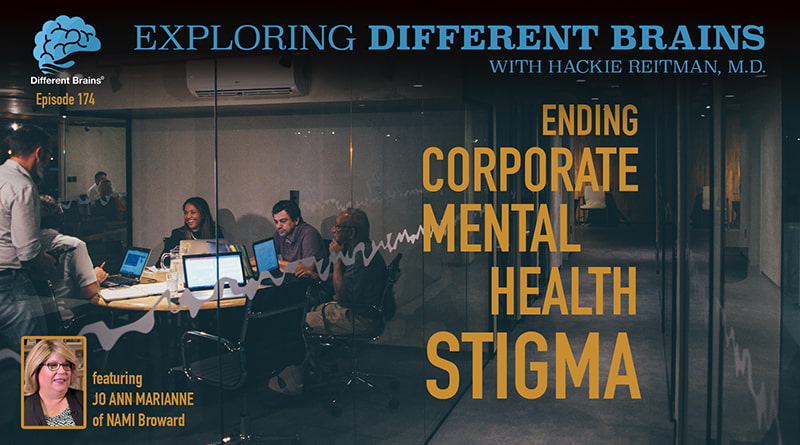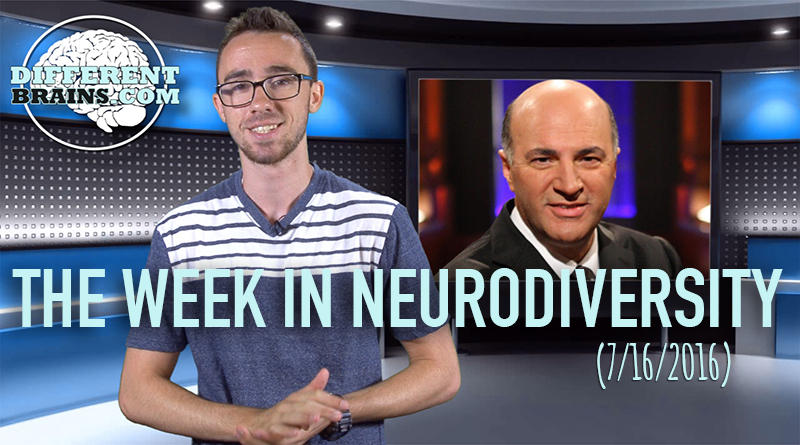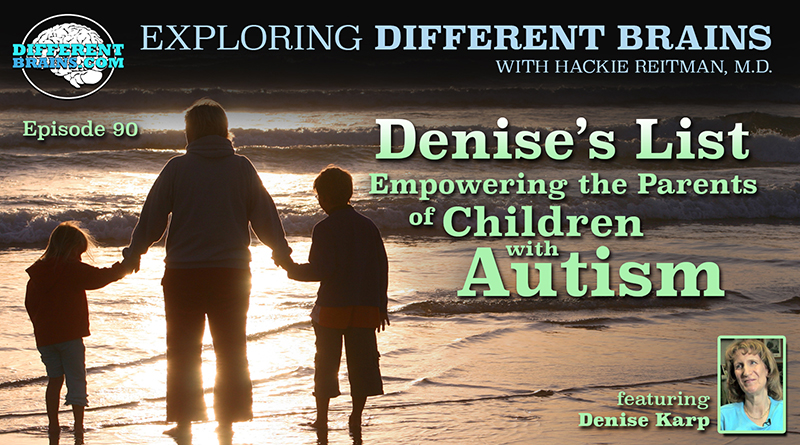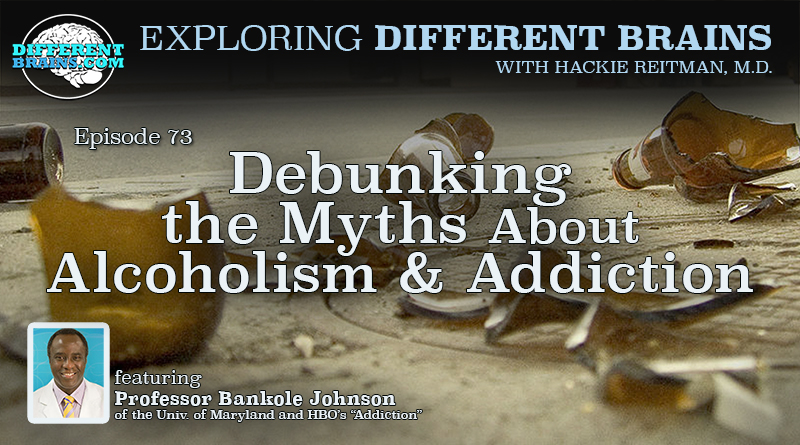
Ending Corporate Mental Health Stigma, with Jo Ann Marianne of NAMI Broward | EDB 174
In this episode Dr. Hackie Reitman speaks with Jo Ann Marianne, a mental health self-advocate and board member of NAMI Broward
(16 minutes) NAMI (National Alliance on Mental Illness) is a grassroots organization of individuals with mental illnesses, especially serious mental illnesses, their family members, and friends whose mission is to advocate for effective prevention, diagnosis, treatment, support, research and recovery that improves the quality of life of persons of all ages who are affected by mental illnesses. Jo Ann shares her struggles with mental illness, gives advice to anyone dealing with a psychiatric diagnosis, and discusses the challenge of dealing with stigma in the corporate world. For more about NAMI Broward: namibroward.org For the national NAMI office: nami.org To listen or download the podcast version of this episode, see the embedded player below.
Or look for us on your favorite podcast provider:
iTunes | Stitcher | SoundCloud
FULL TRANSCRIPTION
The National Alliance on Mental Health’s Battle Against Stigma
HACKIE REITMAN (HR): Hi, I’m Dr. Hackie Reitman and welcome to another episode of Exploring Different Brains. Today, we have Joanna Marianne, who is on the board of NAMI, the National Alliance on Mental Illness right here in Broward County. Welcome!
JO ANN MARIANNE (JM): Thank you very much, Dr. Hackie.
HR: Why don’t you please introduce yourself much better than I just did, Joanne?
JM: No problem. My name is Joanne Marianne and I’m a board member for the National Alliance on Mental Illness here in Broward. I’ve been with the board for about two and a half years and I came to NAMI as a volunteer. The reason why I did that is because I am myself diagnosed with two mental illnesses, and I wanted to seek opportunities to expand awareness, and NAMI was a wonderful choice for me to align with.
HR: And get rid of the stigma too.
JM: Big, big issue.
HR: What are some of your labels — not that I’m big on labels — but what are some of your diagnoses?
JM: So, I am diagnosed with anxiety and depression, and that diagnosis only occurred in my early forties. I was a corporate career employee and had rose the ranks to a very senior level when, one day, after three months of thinking that I was shaking and had something going, that I had an anxiety attacked and was diagnosed as such. So, really my commitment has a lot to do with bettering the environment for corporate employees in corporate America.
HR: Well, I salute you for taking the personal challenges, turning it into a positive thing to help others. That’s what we try to do here at Different Brains. When I wrote the “Aspertools” book, on Asperger’s and autism, it was to help give positive tools. And what you just reminded me of is I was just chastised by some of our neurodiverse staff who noted I’d been under a lot of stress lately, and they suggested why don’t you start writing some articles about stress and maybe do something about it? And I said well I don’t know about that. But I ended up with ‘Ten Percent Happier’, and the reason I bring that up is that was started by Dan Harris, who was an anchor on TV, who had a live on TV panic attack.
JM: Very familiar with it myself. I’ve read his book also.
Educating the Public and Private Sector
HR: Yes, yes, very inspirational. And the mindfulness which has been shown to – now that we have modern technology that can actually measure these things – it’s pretty interesting stuff. Now, so you decided that you’re gonna take the bull by the horns and you’re gonna help NAMI, the National Alliance on Mental Illness here in Broward County, and also nationally. And what are some of the big things on your plate that you really, really feel are the big projects going on?
JM: I think that number one is education. I think that there are a lot of people who are interested and have a natural will to help people. Mental health is not a very clear, understandable medical illness because you don’t see the symptoms or you don’t see something physical, which is probably the better word. So, the more we can educate, the more that people will figure out how they best can support their families, their friends, their coworkers – so I think that’s most important. Of course, that comes with raising awareness, breaking the stigma and a lot of reports recently were corporations are raising and elevating the importance of mental illness so they can support their employees as well.
HR: So, the employee need not be afraid to say look, I am having this issue and here’s the help I need, here are the accommodations I need to do a good job for you.
JM: Yes. In my personal circumstance, when I was diagnosed with depression and anxiety, I myself was working in a corporation and this was eleven years ago. I ended up taking a ninety-day leave of absence, but at the time, everything was – you know – we had HIPAA, of course, but everybody really didn’t know how to help, and when I returned to work, everybody just had a hush hush situation, and that’s of course due to the lack of education by others, and again, this growing trend where corporations are trying to embrace and educate and support. But, you know, one of the things I actually shared with others is that my psychiatrist recommended that I avoid going into hospital treatment because, though everything is private and protected, because of this stigma, if information got out that I was in a mental institution or a mental health organization for treatment, maybe my position would not – maybe I would be judged for the responsibilities that I had.
Positive Affect on the Labor Force
HR: Well, I think that one of the approaches that’s now happening on the corporate front is an interesting one. It’s taking the tact of showing corporations how – look, you can make more money if you accommodate. I was on a panel once with Jose Velasco, the global leader for SAP, the world’s largest software company. And he took me to task on the panel in the sense that he said Hackie, this is not a social welfare program. This is good for our bottom line. This is a business transition. Get the best person for the job, sometimes those differences can be in fact helpful too. So, by looking through the prism of everyone’s brain is a little bit different, how can I help that individual maximize their performance, it’s good for everybody.
JM: Well, there’s obviously lots of surveys out there that talk about absenteeism and how great mental health is most certainly another illness that contributes to absenteeism or sick days. And of course, it could be the individual that they’re taking care of or their family, or family members and friends. No different than a sick child home with the flu could there be a sick child that’s having a difficult time with their diagnosed mental illness.
HR: Sure. And as far as the work time goes, the new statistics are very interesting, especially to me as an orthopedic surgeon. It used to be the biggest thing that had people out of work was back pain, back injuries. Now, it’s mental health issues. And we have to address it and we’ve gotta take the bull by the horns and deal with it. In your capacity of communicating and getting the word out on NAMI, what are some of the projects that you’ve been on and what’s some of the progress that you’ve made?
JM: Well, one of the most recent things that I have started to participate in is what we call NAGS – the NAMI Advocacy Group. This, in Broward County has become a very strong initiative where we are getting behind and pursuing bills that could support mental health people with housing and other types of support, because we have no dedicated housing for those suffering with a mental illness. And, as been mentioned, you have expenses for hospital stays, you have expenses for – even after a hospital – there’s expenses in continuing your recovery. So, there’s a lot of different issues and there needs to be people advocating on behalf of those who are diagnosed with mental illness. So, the NAG group – NAMI Advocacy Group – again, part of NAMI Broward, has initiated this and really has taken it all the way to Tallahassee. So, I think that’s a very important thing that I’ve joined. I’m most certainly learning a lot about all of this, learning about politics, but as much as we can surround every avenue to provide more positive environments for those with mental illnesses, this is a very important thing that we need to do.
The Challenges of Self-Recognition
HR: What are some of the recommendations you can make to those of our audience — and I know you’re not a clinician — but as one who has some degree of anxiety and depression — to those in our Different Brains audience who may have some anxiety and some depression, what advice might you have for them?
JM: You know, the self-recognition sometimes is not that easy, speaking from the heart. Not from being a proud person, although that is a lot of people – it’s pride – but being able to self-recognize is a challenge. You know, it took for me a psychiatrist to diagnose that I wasn’t what I was experiencing. If something feels abnormal, in any case, especially in mental health, it’s always better to seek a professional. And when I went through my experience, which is what I called my explosion day, I was working both with a psychiatrist and a psychologist – I used to call this my A-team. Bottom line, don’t you want to feel your best? And that’s why I think you pursue help, so you can have the best day every day.
HR: Joanne, can you talk about the role that family and friends play in this?
JM: Absolutely. I have first-hand knowledge of that. When I had my diagnosis and I was going through my migration to finding a place that I was stabilized, I had an army of people surrounded by me who were really not sure by what I was going through, but knew that they needed to be there to support me. That really encompassed friends and family, doctors, psychologists or therapists – and that is critical. Nobody really knew, nor did I what I was going through and experienced. A support team is really important. I did also have a hospitalization a few years ago, and it was in the hospital that I really recognized and painfully acknowledged how many people don’t have a support team that I had. Almost call it very lucky, between great benefits, family members supporting them, just holding your hand and saying you’re going to have a better day tomorrow. And I think that really is a very, very big issue. Again, it’s lack of education in a lot of ways.
HR: How can people find out more about your work?
JM: Well, as a board member, I’m part of a board who has board responsibilities. Most certainly, we are part of the Broward County NAMI – that’s what we do. So, really redirecting a lot of what we’re doing is found through the office. A primary role for is definitely reaching out to the community and seeking partners that want to make an investment into NAMI, and that is because we’re a non-profit. The more programs that we can offer the community, the better we’re serving them. And, frankly, that takes money. So, really, that I believe is our charter in many ways.
HR: What is your website?
JM: The NAMI website is www.namibroward.org – and that’s N-A-M-I.
Progress Against Stigma in the Corporate World
HR: Great. Is there anything you would like to cover that we haven’t covered?
JM: I think one of the most pleasing things that I’m seeing right now is CEOs of major corporations – not only financially recognizing productivity loss – but are acknowledging that mental health is just as important as medical help. And now, creating plans and embracing the importance of supporting their employees with mental health. There’s many statistics about how many employees within their corporations there are – I always acknowledge that it’s not necessarily always the employee, but a family member that they could be taking care of, so, that’s a real important trend to me because with my experience eleven years ago, not in any disrespect to my employer, it was just not the time where this acknowledgement was occurring. When you are an employee – you know, this is a big part of your life – so, support and acknowledgment is really, really important, and taking away the stigma by having a positive environment is, in my opinion, very critical to success.
HR: Well, on that note, Joanne, it’s been a pleasure to have you. We’ve been so lucky to have Joanna Marianne, who’s on the board of NAMI National Alliance of Mental Illness right here in Broward Country, and thank you so much for being with us, we hope to have you back again.
JM: Really been my pleasure, thank you. I’d love to come back.




